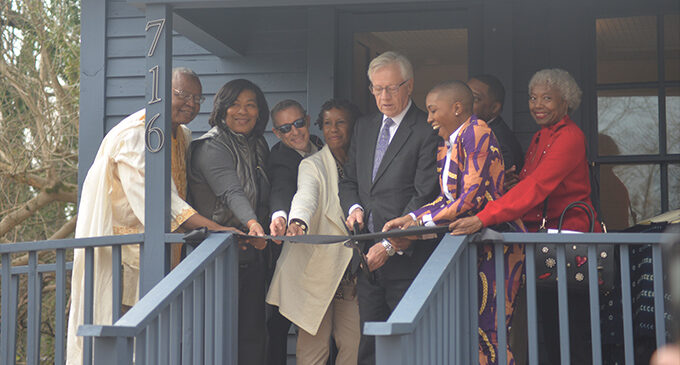Ribbon cutting held for first restored shotgun house in Happy Hill

There was a celebration in Winston-Salem’s first Black neighborhood earlier this week. More than 100 people gathered on Humphrey Street in the historic Happy Hill neighborhood for the ribbon-cutting ceremony Triad Cultural Arts Inc. (TCA) held for the first renovated shotgun house.
Since 2013 the vision of Cheryl Harry, founder of the nonprofit TCA, has been to restore the two shotgun houses in the 700 block of Humprey Street.
Following the Civil War and through the 1920s, shotgun houses were a symbol of Black American freedom in the South. Relatively inexpensive to construct, the shotgun house is a rectangular, one-room wide house up to three rooms deep, with a front porch. This architectural style originated from Yorubaland (West Africa) via Haiti to the American South.
The City of Winston-Salem sold the houses to TCA in 2022, and work to restore the last shotgun houses still intact in the city started last summer. The restored house, dubbed the Shotgun House Legacy Center, features original siding, bricks, and other structural elements.
“This moment is a culmination of dedication, perseverance and a shared commitment to preserving the rich history of the Black experience in Winston-Salem,” said Harry during the ribbon-cutting ceremony. “We’ve worked tirelessly to ensure that this humble, yet powerful structure remains a testament to African American resilience, culture and contribution.”
Mayor Allen Joines and City Council member Anette Scippio congratulated Harry and Triad Cultural Arts for keeping the vision alive.
“It was not easy; there were many times the doors seemed to be closed. But your passion and dedication are the reason we’re here to see this today.”
Winston-Salem/Forsyth County Schools are developing a curriculum for third graders where they will learn about the history of Happy Hill and have an opportunity to visit the Shotgun House Legacy Center.
The history of Happy Hill dates to 1816, when Dr. Friedrich Schumann, who owned slaves, was forced to relocate outside the town of Salem. In 1836, Schumann freed his slaves and paid for them to move to Liberia. In 1872, after the Civil War and emancipation, the Salem Congregation established a neighborhood for Blacks on Schumann’s former plantation. The neighborhood was originally known as Liberia, honoring those who had emigrated, and by 1874 the name Happy Hill was used for the neighborhood.
In 1952, Happy Hill Gardens was completed and became the state’s first federally funded housing project. The housing development was demolished in 2004, and funding allowed for the construction of new, low-income housing.
During the ribbon-cutting ceremony, Abrea Armstrong, executive director of Triad Cultural Arts, announced plans to build a 12,000-15,000 square foot multi-use center. Armstrong said the center will serve as a hub for Black history in the Triad.
“I would like you to join me in creating the preeminent Black, historical and cultural hub, not just for Winston-Salem but the Triad. So that any time a Black creative, thinker, entrepreneur touches down at GSO, we are one of their first stops,” Armstrong said. “If we’re going to call ourselves the City of Arts and Innovation, we must be innovative both in processes and in products, creating a holistic truth-telling story.”










